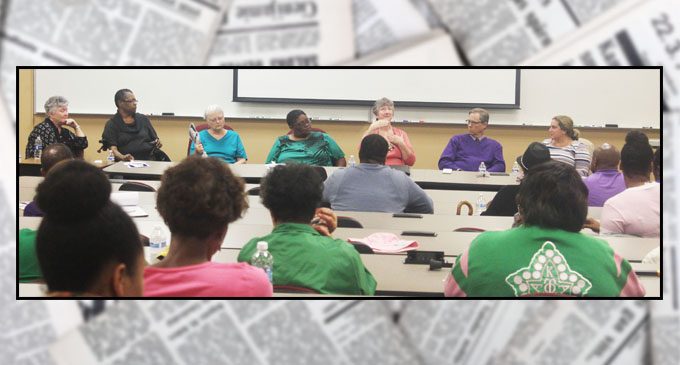Experts say build trust, prepare for worst with mental illness

BY TEVIN STINSON
THE CHRONICLE
Many people in the community are affected by mental health issues in some way. A friend, loved one, or colleague probably has struggled with a disorder at some point in time.
Statistics show in 2014, one in five American adults experienced a mental health issue. At the same point in time, one in 25 lived with a serious mental illness, such as schizophrenia, bipolar disorder, or major depression.
With that said, mental health is still a topic that people rarely discuss openly which has led to a number of misconcep-tions and myths.
Last Thursday, the Winston-Salem Alumnae Chapter of Delta Sigma Theta Sorority, the Phi Omega Chapter of Alpha Kappa Alpha Sorority, and the Psi Phi Chapter of Omega Psi Phi Fraternity joined forces to dispel some of those myths when they hosted “Let’s Talk About It,” a community mental health forum and panel discussion.
During the forum held inside R.J. Reynolds Auditorium on the campus of Winston-Salem State University, a panel of healthcare professionals and caretakers, scholars, and other community stakeholders sat down to discuss mental illness and treatment options.
The panel also featured those who have been directly affected by a mental illness.
Moderator for the event, assistant professor of sociology and criminal studies at Salem College Dr. Kimya Dennis, started the conversation by asking panelists to define mental illness in their own words. President of the Northwest Piedmont Chapter of National Alliance of Mental Illness Louise Whealton said, “When it comes to mental health, I try to take a holistic approach to what needs to occur.” “Sometimes that means education and other times that means treatment.”
When asked about the short-term and long-term effects of mental illness, Kathy Cunningham said when diagnosed with a mental illness, you are treated with little respect.
Cunningham noted when she was diagnosed with serve depression and bipolar disorder in 1996, her life changed for-ever. Not only did she lose her job shortly after being diagnosed, Cunningham mentioned when people find out that she has been diagnosed with a mental illness, that’s all they see.
“You are treated with so little respect,” she said. “When they look at your medical records, bi-polar is what they see first. Not my heart attack or my diabetes, but bi-polar, and that’s the way they treated me.”
Cunningham mentioned the disrespect is something she has to deal with every day.
According to experts on the topic, Cunningham’s treatment from peers, family members and even doctors is nothing new for those dealing with a mental illness. Founder of Our Brother Legion, an interfaith organization which seeks to educate the community to help reduce stigma on behalf of people living with mental illness, trauma and addiction, Reverend Beth Cantrell said the people she knows with a mental illness has the worst medical stories.
While she admits at times it’s not easy, Cantrell encouraged those who need help to go to the doctor.
“If you are sick or need help, go to the doctor,” she continued. “You will find ways to cope, but be prepared because it can be worse than you ever imagined.”
Others who participated in the panel discussion included executive director of the Mental Health Association of Forsyth County (MHAFC) Andy Hagler, Winston-Salem/Forsyth County Schools (WSFCS) program manager Kathy Jordan, licensed professional counselor Mary Jane McGill, WSFCS director of psychological services Corliss Thompson-Drew, and qualified healthcare professional Yolanda McArthur.
Hagler, who has been with MHAFC since 1997, mentioned a number of programs offered in Forsyth County that offer help for those dealing with mental illness and their families. According to Hagler, MHAFC offers support groups, crisis intervention team (CIT) training, and mental health awareness campaigns, just to name a few.
Hagler noted while seeking help may not work every time with every situation, it is important to try to see if it works. He said it all begins with trust.
“Mental illness is real and very common, but it can be treated,” he said. “We have to build that trust.”















